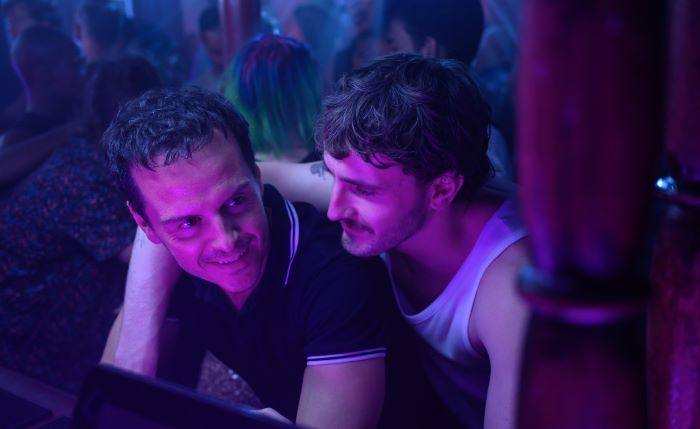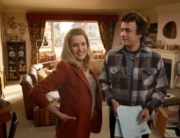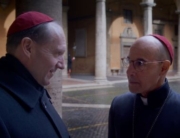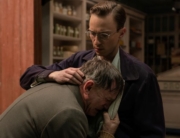My introduction to Andrew Haigh was his 2015 film 45 Years. My sole intention really was to cross an Oscar nominated film off my list, since it looked at first like the sort of tepid domestic drama that typically ends up receiving awards. During perhaps its first half, I had no reason to suspect otherwise. Then, about midway through, I found myself essentially gripping the arms of my chair, finally having realized the extent to which the film had taken hold of me. With an unhurried pace, subtle accumulation of detail, and two definitive performances from the lead actors, Haigh brings us intimately into a marriage that is discovered to be a lie, and allows us to feel keenly how revelations from the past can overwhelm our understanding of the present. It was and is an excellent introduction to a filmmaker who is always worth watching.
All Of Us Strangers is something much more free form, in ways that are and are not to its advantage. Adam (Andrew Scott), a screenwriter, lives alone in a high-rise apartment that looks out over London’s skyline. He stares at his laptop screen, he lies down watching TV, he reaches numbly for aging takeout in his fridge. The light shifts from day to night and back to day as his position remains unchanged. What we see of his unfinished screenplay indicates that it is set in 1987 suburbia.
We later learn that he is in the process of writing about his parents, who died in a car crash in 1987, but this is not the sort of movie about a triumphant creative breakthrough. Instead, he takes the train back to the town where he grew up and mysteriously meets his parents (Claire Foy and Jamie Bell), who are exactly as they were before they died. They seem to know that they are dead, that the middle-aged man who has come to see them is their son, and that much time has passed.
Meanwhile, a young man, Harry (Paul Mescal), who also lives in the apartment building, comes knocking on Adam’s door, begging for company. The two of them fall in love, and Harry becomes the first partner Adam has had in a long time. These two relationships, the one with the ghosts of his parents and the one with his young lover, and Adam’s desire to hold onto them and quench his loneliness are what drive this movie.
All of Us Strangers can be seen as a long, protracted “if only.” If only I could talk to my parents again, if only we could have the discussion about my sexuality we never had, if only we could come clean to each other about the ways we failed one another and hold each other close again. The secondary characters often feel more like ciphers to Adam, or like parts of his mind, and most of the scenes feel like an expression of his emotional state.
A lot of it, especially in the second half, is well described as saccharine. You could simply say that, by the end, there have been a few too many swooning embraces, romantic songs, and sweet, oddly functional conversations for it not to be grating—the film has yielded too much to Adam’s overwhelming longing. Pain is alluded to, sometimes expressed, but also kept an arm’s length.
However, I don’t think that’s the problem, or at least it’s not the whole picture. It’s more that when the characters actually start to discuss their circumstances (how much longer can the parents exist as ghosts for their son? Are they keeping him from moving on with his life?), the results are conventional and unimaginatively rendered. They betray the spirit of the rest of the storyline, which otherwise moves in an intuitive way as though following a mind in dialogue with itself. Adam’s final meeting with his parents is one of the least moving here, and it struck me that the scene where the dead walk the earth in Tim Burton’s Corpse Bride was actually a much more effective rendering of a similar sentiment, not to mention Thornton Wilder’s Our Town.
However, the film’s flaws are definitely not the whole story. Adam is gorgeously played by Scott. His naturalistic ease and the skill with which he captures social awkwardness and buried emotions anchors the film’s romantic sweep. The intimacy between him and Paul Mescal is very affecting, especially in the way they capture the thawing of emotional numbness. An extended sequence which begins at a club and careens into romantic and nightmarish extremes is also compelling, with excellent editing and intriguing suggestions that multiple timelines are coexisting at once. There are also some moving thematic currents, such as when Adam and Harry discuss the nuanced and mysterious causes of their loneliness. It may be that, for many viewers, these strengths will convince them to drop their objections. If the flaws frustrated me as much as they did, it was partially because I had initially been willing to drop objections myself.
If Haigh loses control and succumbs to misguided impulses, one must also respect the degree to which he is ready to take risks.







Leave A Comment